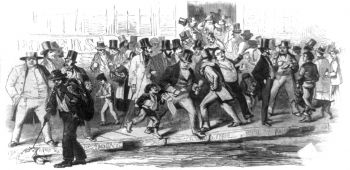Don’t say ‘don’t panic’
Posted on behalf of: School of Psychology
Last updated: Thursday, 29 March 2012

Panic in the streets?
The advice ‘don’t panic’ is worse than useless, according to an expert in crowd behaviour at the University of Sussex.
In a blog post today (Thursday 29 March), psychologist Dr John Drury comments on criticism this week of the government, and sections of the mass media, for promoting so-called ‘panic buying’ of petrol ahead of a possible strike by tanker drivers.
Dr Drury said: “When those in authority say ‘don’t panic’, or even ‘stay calm’, the rest of us know by this that there is definitely something we should be anxious about - for why else would they be warning us in this way?”
Telling people not to panic also sows mistrust, Dr Drury suggests.
“When the government and the mass media tell us that our neighbours are ‘panic buying’, we imagine those around us acting individualistically, rushing to hoard goods for themselves. And if we imagine that everyone else is acting this way, it becomes foolishly self-sacrificial to do otherwise oneself.
“Rather, it becomes completely logical to look after number one.”
But it is journalists, as well as the government, who should be more careful when using the p-word, says Dr Drury. “’Panic buying’ is not panic.
“Panic is a clinical condition marked by an excessive fear and anxiety reaction, which prompts reckless, uncontrolled behaviour.
“People queuing for petrol in so-called ‘panic buying’ may be acting in their personal interest rather than the collective interest, but this is cognitively driven rather than an instinctive ‘flight or fight’ response.
“The queuing and bulk-buying is logical - given people's reasonable beliefs about others’ behaviour and their reasonable mistrust of the authorities.
“It is often the mass media, more than the politicians, who mobilize the ‘panic’ cliché to describe consumer queuing and stock piling.”
You can read Dr Drury’s arguments in full at his blog ‘the crowd’.

